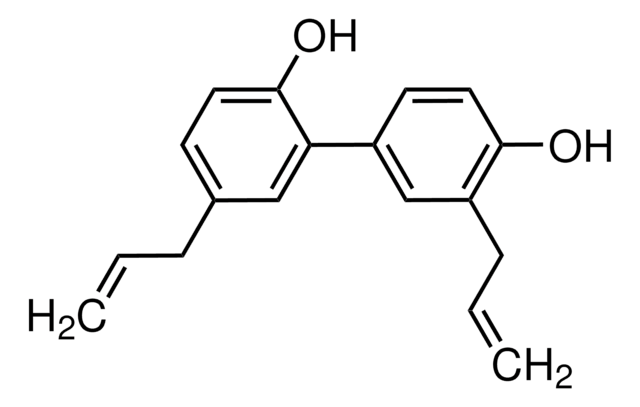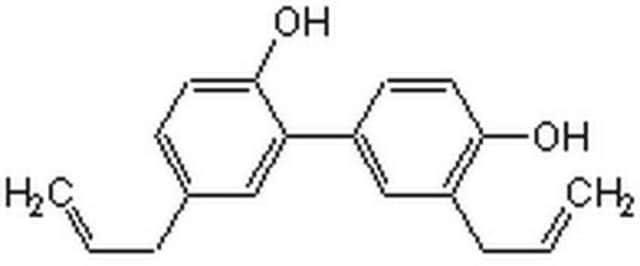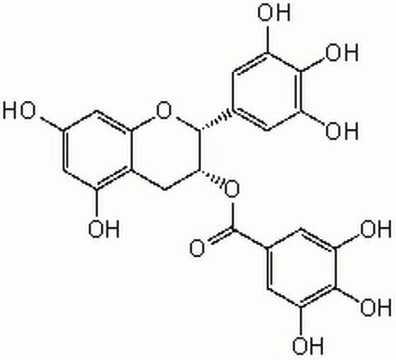H4914
Honokiol
≥98% (HPLC), powder
Sinónimos:
5,3′-Diallyl-2,4′-dihydroxybiphenyl, NSC 293100
About This Item
Productos recomendados
Quality Level
assay
≥98% (HPLC)
form
powder
storage condition
desiccated
solubility
DMSO: 36 mg/mL
antibiotic activity spectrum
Gram-positive bacteria
neoplastics
mode of action
DNA synthesis | interferes
storage temp.
2-8°C
SMILES string
Oc1ccc(cc1CC=C)-c2cc(CC=C)ccc2O
InChI
1S/C18H18O2/c1-3-5-13-7-9-18(20)16(11-13)14-8-10-17(19)15(12-14)6-4-2/h3-4,7-12,19-20H,1-2,5-6H2
InChI key
FVYXIJYOAGAUQK-UHFFFAOYSA-N
¿Está buscando productos similares? Visita Guía de comparación de productos
General description
Application
- to study its effects on plasmid hSirt3102-399 deacetylation activity
- as an antioxidant to study its cytoprotective role in human ovarian cancer cells (SKOV-3) and Chinese hamster ovary cells (CHOK1)
- to explore its effects on oxidative stress and mitochondrial dysfunction via a sirt3-dependent manner
- for intracerebroventricular (ICV) cannulation
Biochem/physiol Actions
Features and Benefits
signalword
Danger
hcodes
Hazard Classifications
Aquatic Chronic 2 - Eye Dam. 1
Storage Class
11 - Combustible Solids
wgk_germany
WGK 3
flash_point_f
Not applicable
flash_point_c
Not applicable
ppe
dust mask type N95 (US), Eyeshields, Gloves
Certificados de análisis (COA)
Busque Certificados de análisis (COA) introduciendo el número de lote del producto. Los números de lote se encuentran en la etiqueta del producto después de las palabras «Lot» o «Batch»
¿Ya tiene este producto?
Encuentre la documentación para los productos que ha comprado recientemente en la Biblioteca de documentos.
Los clientes también vieron
Artículos
Chronic inflammation is an underlying factor in the development and progression of many of the chronic diseases of aging, such as arthritis, atherosclerosis, diabetes, and cancer.
Cell cycle phases (G1, S, G2, M) regulate cell growth, DNA replication, and division in proliferating cells.
Cell cycle phases (G1, S, G2, M) regulate cell growth, DNA replication, and division in proliferating cells.
Cell cycle phases (G1, S, G2, M) regulate cell growth, DNA replication, and division in proliferating cells.
Nuestro equipo de científicos tiene experiencia en todas las áreas de investigación: Ciencias de la vida, Ciencia de los materiales, Síntesis química, Cromatografía, Analítica y muchas otras.
Póngase en contacto con el Servicio técnico
















